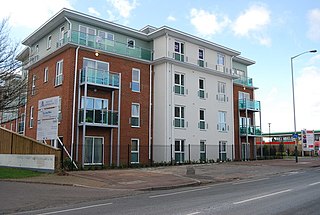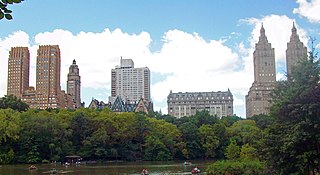
In Ireland and the United Kingdom, housing associations are private, non-profit making organisations that provide low-cost "social housing" for people in need of a home. Any budget surplus is used to maintain existing housing and to help finance new homes and it cannot be used for personal benefit of directors or shareholders. Although independent, they are regulated by the state and commonly receive public funding. They are now the United Kingdom's major providers of new housing for rent, while many also run shared ownership schemes to help those who cannot afford to buy a home outright.

A housing cooperative, or housing co-op, is a legal entity, usually a cooperative or a corporation, which owns real estate, consisting of one or more residential buildings; it is one type of housing tenure. Typically housing cooperatives are owned by shareholders but in some cases they can be owned by a non-profit organization. They are a distinctive form of home ownership that have many characteristics that differ from other residential arrangements such as single family home ownership, condominiums and renting.

The affordability of housing in the UK reflects the ability to rent or buy property. There are various ways to determine or estimate housing affordability. One commonly used metric is the median housing affordability ratio; this compares the median price paid for residential property to the median gross annual earnings for full-time workers. According to official government statistics, housing affordability worsened between 2020 and 2021, and since 1997 housing affordability has worsened overall, especially in London. The most affordable local authorities in 2021 were in the North West, Wales, Yorkshire and The Humber, West Midlands and North East.

The Peabody Trust was founded in 1862 as the Peabody Donation Fund and now brands itself simply as Peabody. It is one of London's oldest and largest housing associations with over 100,000 homes across London and the home counties. It is also a community benefit society and urban regeneration agency, with a focus on placemaking, stewardship and a provider of an extensive range of community programmes.

Kensington is a neighborhood in Philadelphia that belongs to Lower Northeast. As with all neighborhoods in the city, the lack of any official designation means the boundaries of the area vary between sources over time and are disputed among locals. Kensington, as most long-term residents view it, refers generally to the area consisting of Kensington, East Kensington, West Kensington, and Harrowgate. The adjacent Fairhill and Norris Square neighborhoods are more separate but may be included in Kensington; Fishtown and South (Olde) Kensington were historically included. The most conservative boundaries of the neighborhood, shown in the map below, are Front Street and 5th Street to the west, the Amtrak train tracks to the North, Trenton Avenue, the Trenton Avenue train tracks, and Frankford Avenue to the east, and Cecil B. Moore Avenue to the south.
A community land trust (CLT) is a nonprofit corporation that holds land on behalf of a place-based community, while serving as the long-term steward for affordable housing, community gardens, civic buildings, commercial spaces and other community assets on behalf of a community.

Anchor was England’s largest not-for-profit provider of housing, care and support to people over 55 years old up until November 2018 when Anchor merged with Hanover Housing Association to form Anchor Hanover Group, the largest provider of specialist housing and care for older people in England.
Stonewater Ltd is a housing association formed by the merger of Raglan Housing and Jephson Group in 2015. Stonewater owns and manages 32,000 homes and has turnover of £191 million.
Bromford is a housing association providing affordable housing and specialist housing support services. The businesses covers a wide geographical area, predominately Central England and the South West, which includes the West Midlands, Shropshire, Staffordshire, South Gloucestershire, Cirencester, the Cotswolds, Northamptonshire and Buckinghamshire. Bromford also incorporates Bromford Homes, an outright sale business arm providing shared ownership homes to assist private/social renters move onto the property ladder.
Curo Group is a not-for-profit housing association based in Bath, England. Curo's operating area is the West of England, with the majority of its homes located in Bath and North East Somerset where it is the largest housing provider.

Housing in the United Kingdom represents the largest non-financial asset class in the UK; its overall net value passed the £5 trillion mark in 2014. Housing includes modern and traditional styles. About 30% of homes are owned outright by their occupants, and a further 40% are owner-occupied on a mortgage. About 18% are social housing of some kind, and the remaining 12% are privately rented.

Sutton Dwellings, also known as the Sutton Estate, are a series of 14 residential buildings in Chelsea, London, U.K.
The Foyer housing model is a method of transitional housing for youth that evolved from temporary housing for laborers in Europe. After World War II, foyers were used to provide accommodation for a movement of people from rural France to cities seeking work. The term "foyer" means hearth in French. They later developed to house migrant workers, primarily from Algeria, serving as a path to independent labor and accommodation.
Hyde Group is a housing association in London. It is a member of the G15. It operates in London, the South East, the East of England and the East Midlands.

Clarion Housing Group is the largest housing association in the United Kingdom with 125,000 properties across more than 170 local authorities. Clarion Provides a home to over 350,000 people.
Metropolitan Thames Valley, formed from the merge of Metropolitan Housing Trust and Thames Valley Housing Association in 2018, is a housing association (HA) in the United Kingdom with origins back to the 1950s. The Trust manages nearly 38,000 homes and is based in Southgate, London. Metropolitan is a member of the National Housing Federation and the G15 group comprising London’s largest housing associations.
Onward is a housing association in North West England which manages 35,000 properties. Onward is based in Liverpool. Bronwen Rapley is the Chief Executive. In 2020 it moved its headquarters to the new Watson Building in Liverpool’s Renshaw Street. It also from Manchester’s Christie Fields. Rob Loughenbury, former campaign manager for the Conservative Party, was appointed director of strategy in 2020 with a brief to contribute to the regional plans to ‘build back better’ in the wake of the coronavirus pandemic, both as a social landlord and a housebuilder working across Liverpool, Manchester and Cheshire.

Notting Hill Genesis (NHG) is a housing association formed in April 2018 by the merger of Notting Hill Housing and Genesis Housing Association. Notting Hill Genesis’ primary purpose is to work in the community to provide decent and affordable homes for lower-income households.

Affordable housing is housing that is deemed affordable to those with a median household income as rated by the national government or a local government by a recognized housing affordability index. A general rule is no more than 30% of gross monthly income should be spent on housing, to be considered affordable as the challenges of promoting affordable housing varies by location.

Anchor Hanover Group, trading as Anchor, is the largest provider of specialist housing and care for older people in England. It was formed in November 2018 when Anchor Trust and Hanover Housing Association merged. Its main office is in Bradford.











